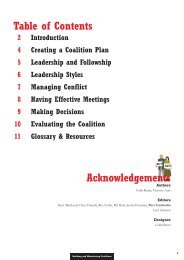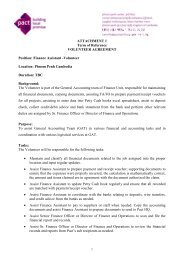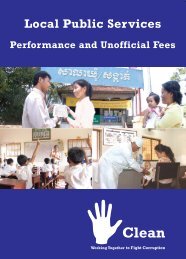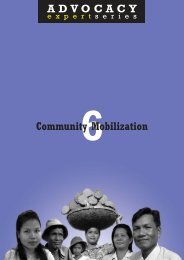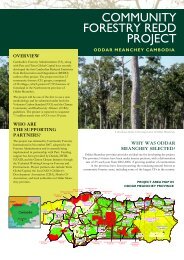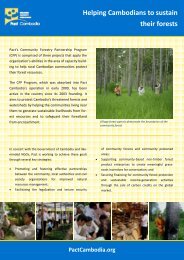Advocacy in Cambodia: Increasing Democratic ... - Pact Cambodia
Advocacy in Cambodia: Increasing Democratic ... - Pact Cambodia
Advocacy in Cambodia: Increasing Democratic ... - Pact Cambodia
You also want an ePaper? Increase the reach of your titles
YUMPU automatically turns print PDFs into web optimized ePapers that Google loves.
Increas<strong>in</strong>g <strong>Democratic</strong> Space<br />
Proactive and Reactive Approaches to<br />
Lobby<strong>in</strong>g<br />
NGOs may take a proactive or reactive<br />
approach when advocat<strong>in</strong>g on the legislative<br />
process. The proactive approach occurs when<br />
advocat<strong>in</strong>g agencies have as their ma<strong>in</strong> mission<br />
advocacy on a particular piece of legislation. In<br />
such cases they usually have specific change<br />
objectives and resources are allocated towards<br />
reach<strong>in</strong>g those objectives. Examples of proactive<br />
approaches <strong>in</strong>clude <strong>in</strong>itiatives by women’s NGOs<br />
to <strong>in</strong>troduce a domestic violence law and update<br />
the exist<strong>in</strong>g family law.<br />
The reactive approach has been used when<br />
advocates have not been programmatically and<br />
f<strong>in</strong>ancially prepared for advocacy on a particular<br />
law because a particular bill was drafted quickly<br />
or <strong>in</strong> a closed process that NGOs were not aware<br />
of. This situation creates certa<strong>in</strong> disadvantages to<br />
the advocacy campaign, <strong>in</strong>clud<strong>in</strong>g limited access<br />
to resources due to lack of plann<strong>in</strong>g.<br />
Unfortunately, much of the advocacy that NGOs<br />
have done <strong>in</strong> the last decade has been reactive,<br />
though as <strong>Cambodia</strong>n advocates ga<strong>in</strong> experience<br />
they are learn<strong>in</strong>g how to ga<strong>in</strong> access to and<br />
<strong>in</strong>fluence the legislative process at an earlier stage.<br />
<strong>Advocacy</strong> Strategies<br />
Strategies used by advocates to <strong>in</strong>fluence the<br />
legislative process are basically the same as those<br />
for all advocates. Information collected through<br />
research and documentation provides critical<br />
arguments for advocates and lawmakers alike.<br />
While <strong>in</strong> some cases legislators may actually not<br />
be aware of a problem, <strong>in</strong> most cases they simply<br />
do not have resources to conduct studies and<br />
demonstrate the degree of a problem.<br />
Establish<strong>in</strong>g personal contacts with decision<br />
makers and engag<strong>in</strong>g them <strong>in</strong> a campaign is<br />
another important strategy for advocates.<br />
Engag<strong>in</strong>g decision makers means help<strong>in</strong>g them to<br />
understand issues, impart<strong>in</strong>g them with the belief<br />
that it is with<strong>in</strong> their mandate to <strong>in</strong>fluence<br />
legislation, and provid<strong>in</strong>g them with <strong>in</strong>formation<br />
needed to further support their arguments for<br />
change. Once decision-makers have been engaged,<br />
advocates need to provide them with opportunities<br />
to get a first-hand view of issues through site visits<br />
or contact with affected stakeholders.<br />
Another effective advocacy strategy is<br />
lobby<strong>in</strong>g the m<strong>in</strong>istry most relevant to a particular<br />
piece of legislation. Be<strong>in</strong>g able to give <strong>in</strong>puts to a<br />
draft law at the m<strong>in</strong>isterial level is critical to ensure<br />
that issues of concern to the public are reflected<br />
<strong>in</strong> the draft. Successful advocates work with l<strong>in</strong>e<br />
m<strong>in</strong>istries at different stages and assist them to<br />
accomplish their mandated function. The more<br />
ownership the m<strong>in</strong>istry has of the draft law that<br />
does not <strong>in</strong>clude the voice of the people through a<br />
consultative process, the harder it will be to<br />
advocate for it. One strategy is to let the m<strong>in</strong>istry<br />
take credit for the draft<strong>in</strong>g or technical work even<br />
though much of it could have come from civil<br />
society. The ultimate objective is to make the<br />
m<strong>in</strong>istry or technical department an advocate for<br />
the law.<br />
Campaign<strong>in</strong>g After Submission of Draft<br />
Legislation<br />
Be<strong>in</strong>g able to get modified or new legislation<br />
drafted or proposed is a significant achievement,<br />
but it is only one of many steps <strong>in</strong> this type of<br />
advocacy campaign. Advocates need to cont<strong>in</strong>ue<br />
efforts to ensure that the f<strong>in</strong>al version of the<br />
legislation conta<strong>in</strong>s what they feel is needed, and<br />
that this version will be promulgated.<br />
Enacted legislation usually delegates<br />
responsibility to the executive branch, i.e. the<br />
Royal Government of <strong>Cambodia</strong>, to pass<br />
regulations that detail implementation of the law,<br />
as the legislative branch does not have the time,<br />
resources, or required expertise to specify how<br />
laws should be implemented. Regulations issued<br />
by the government also constitute law and <strong>in</strong>clude:<br />
• sub-decrees (anu kret);<br />
• proclamations (prakas);<br />
• decisions (sach k’dei samrach); and<br />
• circulars (sarachors).<br />
With the exception of the Community<br />
Fisheries Sub-decree, the advocacy campaigns<br />
exam<strong>in</strong>ed <strong>in</strong> the attached case studies focus solely<br />
on laws passed by Parliament. Less attention has<br />
been paid to executive regulations, which often<br />
enumerate the most important aspects of a law.<br />
Therefore, campaign efforts should not cease<br />
simply because legislation is passed. Efforts must<br />
extend beyond enactment and be closely <strong>in</strong>volved<br />
with the implementation of the law as well. For<br />
<strong>in</strong>stance, the new Land Law requires the pass<strong>in</strong>g<br />
of a dozen subsequent sub-decrees that are<br />
essential to implementation. This presents a<br />
challenge for civil society organizations to closely<br />
monitor the development of the sub-decrees as<br />
well and to advocate for participation <strong>in</strong> the<br />
draft<strong>in</strong>g of those regulations.<br />
Factors Contribut<strong>in</strong>g to Satisfactory<br />
Outcomes<br />
Establish<strong>in</strong>g good relations with a m<strong>in</strong>istry<br />
is perhaps the most important factor <strong>in</strong> achiev<strong>in</strong>g<br />
a successful outcome to advocacy efforts. Other<br />
factors <strong>in</strong>clude lobby<strong>in</strong>g parliamentarians through<br />
34





